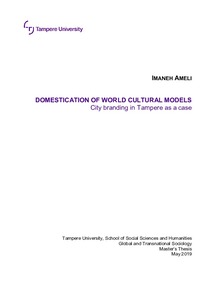Domestication of world cultural models, city branding in Tampere as a case
Imaneh, Ameli (2019)
Imaneh, Ameli
2019
Yhteiskuntatieteiden tiedekunta - Faculty of Social Sciences
This publication is copyrighted. You may download, display and print it for Your own personal use. Commercial use is prohibited.
Hyväksymispäivämäärä
2019-05-22
Julkaisun pysyvä osoite on
https://urn.fi/URN:NBN:fi:tuni-201907262749
https://urn.fi/URN:NBN:fi:tuni-201907262749
Tiivistelmä
This thesis explores the discursive and rhetorical process of domestication of world cultural models through analyzing the rhetoric of city branding in Tampere. The case study examines how the justification of world cultural model of place branding happens in the local context of Tampere. The focal point is that the rhetoric of Tampere municipality attempts to convince their local audience that city branding is necessary.
I study the rhetoric of city branding in Tampere through new-institutionalism and domestication theories. The isomorphic spread of place branding model worldwide can be described through the world culture and world society. However, what happens in the local context when the world cultural models are intended to be employed is crucial and the domestication theory explains this process very well. The main purpose is to understand how domestication of world cultural model of place branding happens in the local context of Tampere by posing this main question that how the municipality justifies the necessity of a brand for the city rhetorically.
I have interviewed agents of branding project in the municipality of Tampere. The interviews and the texts provided in related websites, workshops and seminars related to city branding in Tampere are the main data. The data is analyzed through the method of rhetorical theory in order to find out what the premises of the city branding rhetoric are. Premises of the rhetoric describe what values are assumed to be the most prevalent in society.
The result is found through discussing the premises of the city branding rhetoric in frame of epistemic governance. This means what the municipality of Tampere has done to justify the necessity of city branding, is epistemic. In other words, they have tried to influence the local politicians, resident and all the stakeholders via rhetoric and the premises of this rhetoric consist of particular (i.e. local) and universal imageries and values. The municipality could not simply introduce city branding with merely fact and truth to the local audience, rather involving combination of universal and local values has turned the rhetoric to a persuasive one. World cultural model of city branding is applied locally, is domesticated rhetorically and the domestication process has gone through an epistemic work.
I study the rhetoric of city branding in Tampere through new-institutionalism and domestication theories. The isomorphic spread of place branding model worldwide can be described through the world culture and world society. However, what happens in the local context when the world cultural models are intended to be employed is crucial and the domestication theory explains this process very well. The main purpose is to understand how domestication of world cultural model of place branding happens in the local context of Tampere by posing this main question that how the municipality justifies the necessity of a brand for the city rhetorically.
I have interviewed agents of branding project in the municipality of Tampere. The interviews and the texts provided in related websites, workshops and seminars related to city branding in Tampere are the main data. The data is analyzed through the method of rhetorical theory in order to find out what the premises of the city branding rhetoric are. Premises of the rhetoric describe what values are assumed to be the most prevalent in society.
The result is found through discussing the premises of the city branding rhetoric in frame of epistemic governance. This means what the municipality of Tampere has done to justify the necessity of city branding, is epistemic. In other words, they have tried to influence the local politicians, resident and all the stakeholders via rhetoric and the premises of this rhetoric consist of particular (i.e. local) and universal imageries and values. The municipality could not simply introduce city branding with merely fact and truth to the local audience, rather involving combination of universal and local values has turned the rhetoric to a persuasive one. World cultural model of city branding is applied locally, is domesticated rhetorically and the domestication process has gone through an epistemic work.
